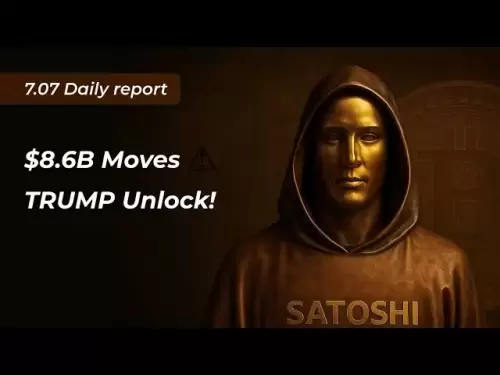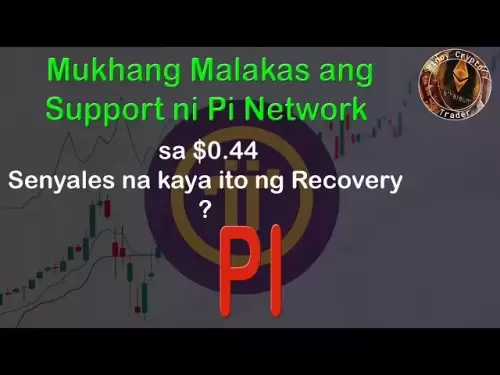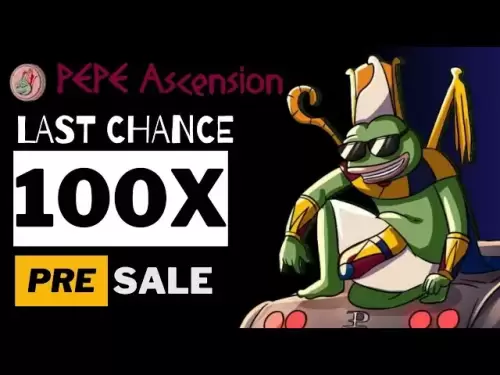-
 Bitcoin
Bitcoin $108,708.8110
0.60% -
 Ethereum
Ethereum $2,561.6057
1.91% -
 Tether USDt
Tether USDt $1.0001
-0.03% -
 XRP
XRP $2.2795
0.57% -
 BNB
BNB $662.2393
1.00% -
 Solana
Solana $153.1346
3.74% -
 USDC
USDC $1.0000
0.00% -
 TRON
TRON $0.2877
0.97% -
 Dogecoin
Dogecoin $0.1710
3.93% -
 Cardano
Cardano $0.5871
1.61% -
 Hyperliquid
Hyperliquid $39.6663
1.68% -
 Sui
Sui $2.9032
0.79% -
 Bitcoin Cash
Bitcoin Cash $496.1879
1.71% -
 Chainlink
Chainlink $13.5807
3.01% -
 UNUS SED LEO
UNUS SED LEO $9.0777
0.61% -
 Stellar
Stellar $0.2514
4.51% -
 Avalanche
Avalanche $18.1761
1.86% -
 Shiba Inu
Shiba Inu $0.0...01173
1.72% -
 Toncoin
Toncoin $2.8010
-4.23% -
 Hedera
Hedera $0.1594
3.21% -
 Litecoin
Litecoin $87.0257
-0.53% -
 Monero
Monero $319.1217
1.79% -
 Polkadot
Polkadot $3.3853
0.68% -
 Dai
Dai $0.9999
-0.01% -
 Ethena USDe
Ethena USDe $1.0003
0.02% -
 Bitget Token
Bitget Token $4.3420
-0.97% -
 Uniswap
Uniswap $7.3772
1.39% -
 Aave
Aave $286.6277
5.61% -
 Pepe
Pepe $0.0...09994
2.33% -
 Pi
Pi $0.4589
1.76%
What cryptocurrencies does Ethereum Wallet support?
Ethereum wallets, like MetaMask, don't directly support specific cryptocurrencies but interact with the Ethereum blockchain and ERC-20 tokens (and others), requiring ETH for gas fees. Thousands of tokens, including ETH, USDC, and UNI, are accessible, though wallet compatibility varies; always check documentation.
Mar 23, 2025 at 04:21 am
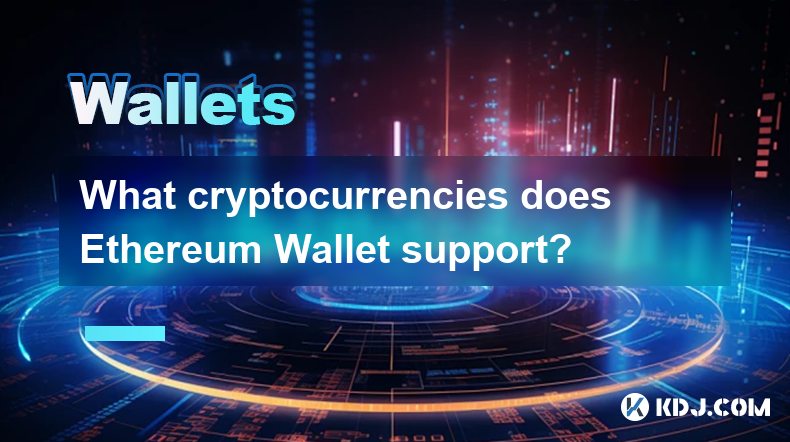
What Cryptocurrencies Does Ethereum Wallet Support?
The Ethereum Wallet, often referred to as MetaMask or other similar interfaces, doesn't directly "support" cryptocurrencies in the way a centralized exchange might. Instead, it supports interacting with the Ethereum blockchain and any token built on that blockchain using the ERC-20 standard (and other compatible standards). This means the range of cryptocurrencies accessible is vast and ever-expanding. It’s crucial to understand that the wallet itself doesn't hold the crypto; it holds the private keys that allow access to your crypto held on the blockchain.
The primary cryptocurrency supported, naturally, is Ether (ETH), the native cryptocurrency of the Ethereum network. This is because all transactions on the Ethereum network require ETH for gas fees, which are essentially transaction costs. Without ETH, you cannot interact with the network or send or receive any tokens. Therefore, having ETH in your Ethereum wallet is essential for functionality.
Beyond ETH, the real breadth of supported cryptocurrencies lies in the ERC-20 tokens. These are tokens built on the Ethereum blockchain, following a specific technical standard that allows for easy integration with Ethereum wallets. Thousands of ERC-20 tokens exist, representing a wide range of projects, from decentralized finance (DeFi) platforms to non-fungible tokens (NFTs) and utility tokens. Examples include stablecoins like USDC and USDT, governance tokens like UNI, and countless others.
It's important to note that simply because a token is an ERC-20 token doesn't automatically guarantee compatibility with every Ethereum wallet. While the vast majority will work, some wallets may have limitations or might not list every single ERC-20 token available. Always check the specific wallet's documentation to confirm support for a particular token before attempting to add it. Furthermore, some wallets might require you to add the token manually by inputting its contract address.
Beyond ERC-20, the Ethereum ecosystem supports other token standards. ERC-721 tokens, for example, are commonly used for NFTs. While not a cryptocurrency in the traditional sense, many Ethereum wallets readily support these, allowing users to view, manage, and trade their NFT collections. Similarly, other standards, like ERC-1155, exist and offer different functionalities. The compatibility of your chosen wallet with these standards should be verified individually.
Adding a new token to your Ethereum wallet usually involves a simple process:
- Identify the token: Find the token's contract address on a reputable blockchain explorer like Etherscan.
- Add the token: Most wallets have a built-in function to add custom tokens. This typically involves pasting the contract address and the token symbol.
- Verify the addition: Once added, check your wallet to confirm the token has appeared in your balance.
However, it is critical to exercise caution. Before interacting with any token, verify its legitimacy and the reputation of the project behind it. Scams and fraudulent tokens are prevalent in the cryptocurrency space, and adding unknown tokens to your wallet could expose you to significant risk. Always research thoroughly before interacting with any new token.
The ability to interact with various decentralized applications (dApps) built on Ethereum is another critical aspect of what an Ethereum wallet "supports." These dApps often utilize various tokens and provide unique functionalities, further expanding the practical scope of your wallet beyond simple token storage and transfers.
Understanding gas fees is paramount when using an Ethereum wallet. These fees are paid in ETH and are required for every transaction, regardless of the token being transferred. The amount of gas needed varies depending on network congestion and the complexity of the transaction. High gas fees can make transactions expensive, particularly during periods of high network activity.
Security is of utmost importance. Never share your private keys or seed phrase with anyone. Losing your private keys means losing access to your cryptocurrency. Always use reputable wallets and practice good security habits to protect your assets. Consider using a hardware wallet for enhanced security if you hold significant amounts of cryptocurrency.
Choosing the right Ethereum wallet depends on your individual needs and technical expertise. Some popular options include MetaMask, Trust Wallet, Ledger Live, and MyEtherWallet, each with its own strengths and weaknesses. Research different options to find the best fit for your requirements.
Frequently Asked Questions:
Q: Does Ethereum Wallet support Bitcoin?
A: No. Ethereum Wallet is designed for the Ethereum blockchain and its associated tokens. Bitcoin operates on a separate blockchain and requires a different type of wallet.
Q: Can I use my Ethereum Wallet for NFTs?
A: Yes, many Ethereum wallets support ERC-721 and ERC-1155 tokens, which are commonly used for NFTs.
Q: How do I add a new token to my Ethereum Wallet?
A: You typically add a token by inputting its contract address and symbol into your wallet's interface. The exact steps vary depending on the specific wallet you are using.
Q: Are there any fees associated with using an Ethereum Wallet?
A: Yes, you will incur gas fees (paid in ETH) for every transaction you make on the Ethereum network. These fees are not specific to the wallet itself, but rather a cost of using the Ethereum blockchain.
Q: Is my cryptocurrency stored in the Ethereum Wallet itself?
A: No, your cryptocurrency is stored on the Ethereum blockchain. The Ethereum wallet holds your private keys, which give you access to your crypto on the blockchain.
Q: How secure is an Ethereum Wallet?
A: The security of your Ethereum wallet depends on your practices. Strong passwords, secure seed phrase management, and using a reputable wallet are essential for security. Hardware wallets offer additional protection.
Disclaimer:info@kdj.com
The information provided is not trading advice. kdj.com does not assume any responsibility for any investments made based on the information provided in this article. Cryptocurrencies are highly volatile and it is highly recommended that you invest with caution after thorough research!
If you believe that the content used on this website infringes your copyright, please contact us immediately (info@kdj.com) and we will delete it promptly.
- Bitcoin, Jon Atack, and El Salvador: A Crypto Conundrum
- 2025-07-07 23:15:12
- Google, AI Chatbots, and Altcoins: Navigating the Shifting Sands of Search and Crypto
- 2025-07-07 23:15:12
- By Georgia:
- 2025-07-07 23:50:57
- Ethereum (ETH) Analyst Points: Is a Major Breakout Imminent?
- 2025-07-07 23:55:12
- BBVA's Crypto Leap: Bitcoin and Ethereum for the Masses?
- 2025-07-07 22:30:12
- Bitcoin, Strategy, and Windfalls: Decoding the Latest Moves
- 2025-07-07 22:30:12
Related knowledge

How to cancel a pending transaction in Phantom wallet?
Jul 03,2025 at 07:21pm
Understanding Pending Transactions in Phantom WalletA pending transaction in the Phantom wallet occurs when a user initiates a transfer or interaction with the Solana blockchain, but it hasn't yet been confirmed by the network. This can happen due to various reasons such as low transaction fees, network congestion, or incorrect gas settings. It's import...

How to see the estimated value of my tokens in Phantom wallet?
Jul 04,2025 at 12:21am
What is Phantom Wallet?Phantom wallet is one of the most popular cryptocurrency wallets designed for the Solana blockchain. It allows users to store, send, receive, and manage various tokens built on Solana, including SPL tokens and NFTs. The wallet offers a user-friendly interface, making it accessible for both beginners and advanced users in the crypt...

How to lock my Phantom wallet extension?
Jul 03,2025 at 11:14am
What Is the Phantom Wallet and Why Lock It?The Phantom wallet is a popular non-custodial cryptocurrency wallet designed for interacting with the Solana blockchain. Supporting both browser extensions and mobile apps, Phantom allows users to store, send, receive, and stake SOL tokens, as well as interact with decentralized applications (dApps). Securing y...

Does Phantom wallet offer two-factor authentication (2FA)?
Jul 03,2025 at 09:00am
Understanding Phantom Wallet and Its Security FeaturesPhantom wallet is a widely used non-custodial cryptocurrency wallet that supports the Solana blockchain. It allows users to store, send, receive, and interact with decentralized applications (dApps) seamlessly. As security is a top priority for any crypto wallet user, security features like two-facto...
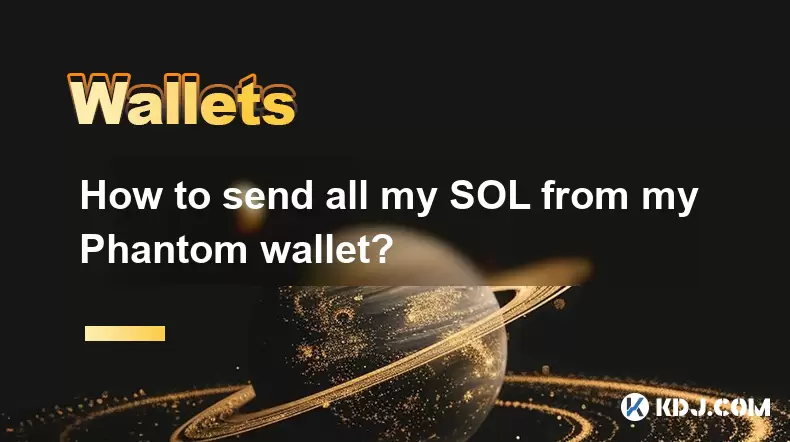
How to send all my SOL from my Phantom wallet?
Jul 06,2025 at 10:00am
Preparing to Send SOL from Your Phantom WalletBefore initiating any transaction, it is crucial to ensure that your Phantom wallet is fully set up and connected to the correct network. Phantom supports multiple networks, but for sending SOL, you must be on the Solana blockchain. Confirm this by checking the network indicator in the top-right corner of th...

What is "rent" on Solana and how does it affect my Phantom wallet?
Jul 02,2025 at 08:35pm
Understanding 'Rent' on SolanaIn the context of Solana, the term 'rent' refers to a storage fee that users pay for maintaining data on the blockchain. Unlike Ethereum, where storage costs are paid once via gas fees during contract deployment, Solana implements a recurring cost model to ensure efficient usage of network resources. This means that any acc...

How to cancel a pending transaction in Phantom wallet?
Jul 03,2025 at 07:21pm
Understanding Pending Transactions in Phantom WalletA pending transaction in the Phantom wallet occurs when a user initiates a transfer or interaction with the Solana blockchain, but it hasn't yet been confirmed by the network. This can happen due to various reasons such as low transaction fees, network congestion, or incorrect gas settings. It's import...

How to see the estimated value of my tokens in Phantom wallet?
Jul 04,2025 at 12:21am
What is Phantom Wallet?Phantom wallet is one of the most popular cryptocurrency wallets designed for the Solana blockchain. It allows users to store, send, receive, and manage various tokens built on Solana, including SPL tokens and NFTs. The wallet offers a user-friendly interface, making it accessible for both beginners and advanced users in the crypt...

How to lock my Phantom wallet extension?
Jul 03,2025 at 11:14am
What Is the Phantom Wallet and Why Lock It?The Phantom wallet is a popular non-custodial cryptocurrency wallet designed for interacting with the Solana blockchain. Supporting both browser extensions and mobile apps, Phantom allows users to store, send, receive, and stake SOL tokens, as well as interact with decentralized applications (dApps). Securing y...

Does Phantom wallet offer two-factor authentication (2FA)?
Jul 03,2025 at 09:00am
Understanding Phantom Wallet and Its Security FeaturesPhantom wallet is a widely used non-custodial cryptocurrency wallet that supports the Solana blockchain. It allows users to store, send, receive, and interact with decentralized applications (dApps) seamlessly. As security is a top priority for any crypto wallet user, security features like two-facto...

How to send all my SOL from my Phantom wallet?
Jul 06,2025 at 10:00am
Preparing to Send SOL from Your Phantom WalletBefore initiating any transaction, it is crucial to ensure that your Phantom wallet is fully set up and connected to the correct network. Phantom supports multiple networks, but for sending SOL, you must be on the Solana blockchain. Confirm this by checking the network indicator in the top-right corner of th...

What is "rent" on Solana and how does it affect my Phantom wallet?
Jul 02,2025 at 08:35pm
Understanding 'Rent' on SolanaIn the context of Solana, the term 'rent' refers to a storage fee that users pay for maintaining data on the blockchain. Unlike Ethereum, where storage costs are paid once via gas fees during contract deployment, Solana implements a recurring cost model to ensure efficient usage of network resources. This means that any acc...
See all articles





















